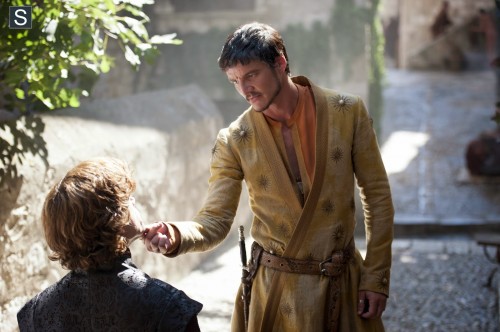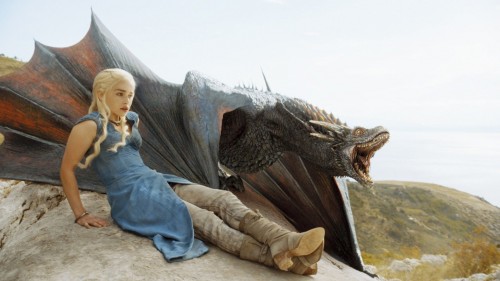
Spoilers Below
“Chaos isn’t a pit; chaos is a ladder. Many who try to climb it fail and never get to try again. The fall breaks them. And some are given a chance to climb, but they refuse. They cling to the realm or the gods or love – illusions. Only the ladder is real. The climb is all there is.”
-Littlefinger, Season 3
By the end of Season 3, the realm-spanning “War of the Five Kings” was well at a close. After the Blackwater, the Lannisters had eliminated their main threat from the South, and the Red Wedding took care of the bulk of the North’s power, no matter how well and painfully they “remember”. Littlefinger’s ladder of massive, epic conflict has fragmented into smaller subplots: Jon’s fraught relationships with both Wildlings and Watch, Theon/Reek’s captivity and his sister’s rescue effort, Arya’s fugitive exile with the Hound, Tyrion’s continued efforts to stymie the recession of his power and prestige in King’s Landing, Sansa’s misery, Jaime’s stilted homecoming, and Daenerys’s liberation campaign. King Joffrey and his mother Cersei, the winners of the war, look smaller with each episode as their father consolidates his influence. And so Benioff, Weiss, Martin and Company are drilling down even more to fragmented individual ‘ladders’ and the relationships between them. Watching these relationships and factions develop – with ever more subplots always spinning of – might be tiresome were the writing and direction not as good as they are, and were Martin not promising to draw the threads back together in the fullness of time.
It’s nice that despite the heavy task of bringing viewers up to speed on 10+ subplots, Sunday’s episode managed to achieve some depth, too. Desire and withholding were prominent themes. Individual characters on their own mini-ladders want, and they’re usually thwarted by bigger concerns, as the show of power must go on. Despite Joffrey’s kingship, Cersei’s status as Queen Regent, and Jaime’s status as a leader and fighter, they’re still to some degree adult kids, with Tywin pulling the strings and telling them what to do. Cersei must marry Loras, and she and her brother must stop their affair. Tywin rubs salt in the wound of Jaime’s amputation, threatening to dismiss him from the Kingsguard. Oberyn wants revenge, and Tyrion tries to deflect him as much as possible. Jon wants vindication for betraying the Watch, Sansa wants to leave King’s Landing, and Arya’s mainly just out for blood.
Ultimately, these agendas embody a tension between the violence and libido of the id, on the one hand, and a call for justice, on the other. The current order of Westeros is a strange balance between the two, the old political idea of the state as arbitrating among different factions or “players” in the game and trying to make everyone happy while maintaining stability. In some ways, Tywin’s political success results from the purity of his agenda: he’s out for Lannister power, and he won’t allow many personal concerns – like honor (Ned) or hotheadedness (Jaime) or honesty (Davos) – get in the way. The Game demands that someone sacrifice all else to succeed, and Tywin’s done this, with the one exception of his enduring bias against Tyrion, whose advice would be indispensable and whose savvy exceeds even his father’s. But lest we begin to think that Tywin’s control is absolute, Varys and Littlefinger were conspicuously absent Sunday. And following the classic fantasy conventions, the smaller characters, who are forgotten by Tywin and out of power, have become the new focus of the show. We could perhaps do a “power ranking” of houses (below), but it’s something more akin to fate or destiny or providence or merely viewer interest which makes the Aryas and Briennes of the world the most crucial characters.
1. Lannister (finally consolidated power, Tywin’s at the top.)
2. Tyrells (Margaery set up for queenship, they’re feeding the city, and their army’s less depleted than the Lannisters’. But their leadership lacks the Lannisters’ savvy.)
3. Martells (Where have they been all this time? Mostly in reserve to give Martin a wildcard for plot reasons; we’ll see how he uses it.)
4. Arryn (Their lands are the most defensible and they were unscathed in the war of the five kings, but Lysa seems isolationist, and Lord Robert is no major force himself.)
5. Targaryen(would be (1), but dragons are still pretty young, and no ships yet.)
6. Boltons/Freys (two most powerful houses in the North)
7. Greyjoys (haven’t done too much lately, but looking forward to progress on Yara’s rescue mission)
8. Stark (Jon’s loyalty is suspect at the Wall, Arya and Bran are MIA, and Sansa’s a political pawn)
Rankings are mostly for the fun of it – pretty subjective, but it’s a show about power, after all – though they help to illustrate the point that like much great fantasy (see Narnia, LOTR), the screentime of characters is almost inversely proportional to the influence they exercise. The joy of this season will be watching people like Arya Stark and Jon Snow develop as characters before their arcs slowly start to reconverge with all the upheavals of the Westerosi world-stage. The least shall be the greatest, exile and suffering must precede genuine accomplishment, and all that other literary/biblical stuff. Coming back to desire though, it’s impossible to review “Two Swords” without parsing that brilliant (over 10 minutes!) closing scene.
From a writing perspective, Benioff, Weiss, and Martin excel when they can condense enough material in an episode to allow one extended, slow-paced scene. Allowing for those slowdowns and choosing which scene to dwell on can sometimes make or break an episode. Here, the choice was the right one; the inn scene sums up and thematically ties off the episode. It starts with bickering between Arya and the Hound, whose ongoing repartee is among the best in the series. It’s wearily good-natured, dark, and clever in spite of itself. She wants a horse, which symbolizes status and freedom, and the Hound mocks her – “little girl wants a pony.” Arya, more than anyone, is a weak character in the world’s eyes, continually underestimated. When they get to the inn, she wants her sword, and she wants revenge.
Reluctantly, the Hound goes into the inn and can’t help but offending the other patrons, pillagers who prey on villages and inns amidst the disorder of the infighting realm. Arya has a personal grudge against them, and the Hound mocks her (“he stole Needle, my sword” – “you named your sword??”). It may just be because he was itching for a fight, but on one reading, the Hound’s unexpected code of ethics compels him to stand up to the men. As he fights them, Arya watches from the corner, a spectator like us. Finally, she decides to enter the story, bashing a man’s skull with a pot and then systematically killing several men. It’s an exciting moment for Arya’s character (however morally/physically grotesque it may be), and it points to the promise of this whole season, and perhaps series: that the meandering exposition of these side characters may, eventually, lead them to re-engage the story, to come back into history as major players. But if the later episodes are like this one, we may just be examining lots of subplots and waiting (give Daenerys a fleet, please!) for these characters to come into their own. Fortunately, the writing, acting, and photography are good enough that even when things seem to stall, it’s still good to watch.
Stray thoughts:
-Sansa’s still got her escape planned, and despite Varys’s ears and eyes and friends across the Narrow Sea, Littlefinger’s still the wildcard. Hopefully, whatever his agenda, it’ll develop some next episode.
-Kudos for the realistic swordfighting at the end. You get a sense of their weight and the bullish strength of the Hound, even if it’s less fancy than the “water-dancing” style of LOTR or Pirates of the Caribbean.
-And to book fans, apologies for using “War of the Five Kings” above – as Archmaester Benedict points out, Renly was dead before Balon Greyjoy declared independence.

COMMENTS
One response to “On TV: “Two Swords”, Game of Thrones (4.1)”
Leave a Reply
















I loved the books and want to watch this series, but the older I get, the less I can handle violence. I tried watching The Walking Dead and only made it an episode and a half into the first season. There was just too much raw and realistic violence. I doubt I can handle this show for the same reason. I suppose it’s easier to tone things down when you read the books while relying on your own imagination. Oh, and great article! It’s fun to see how the show progresses and how it compares to the books.